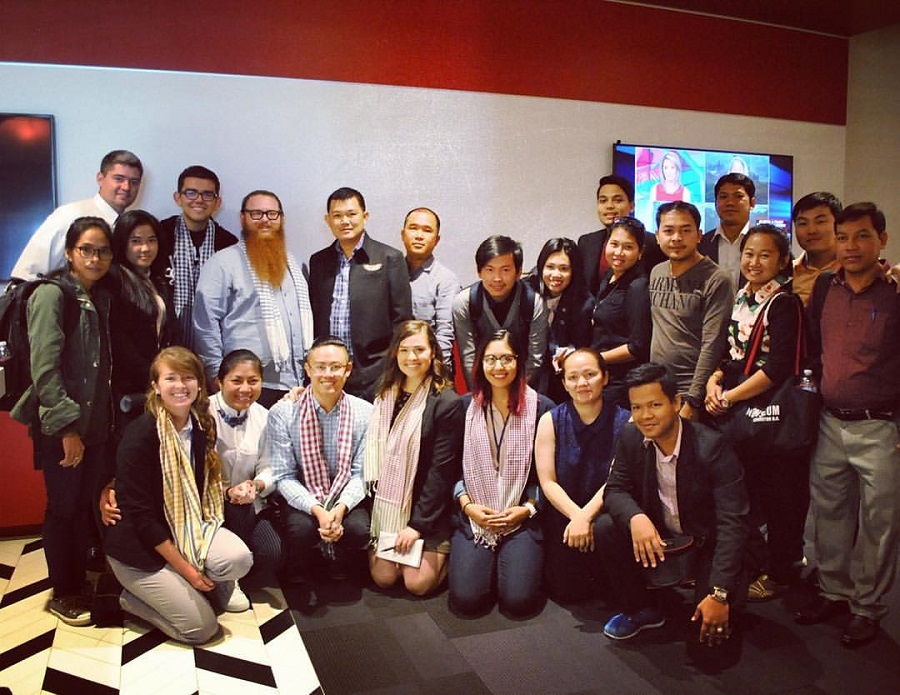
As a city teeming with the highest population of Cambodians outside of Cambodia (approximately 19,998, according to the last U.S. Census), Long Beach is on the international destination map for many Khmer residents.
We were excited, nonetheless, that the International Center for Journalists (ICFJ) selected the Long Beach Post as a destination for a group of highly intelligent and daring Khmer journalists. Journalists whose families, like many of those in Long Beach, weathered the government-inflicted agrarian revolution and genocide of the Khmer Rouge in the 1970s.
One, Bopha Phorn, had been shot at, receiving the 2013 Courage in Journalism Award from the International Women’s Media Foundation (IWMF). Another, Samean Lay, is famous in Cambodia for a highly publicized beating from security personnel that occurred while covering a protest rally in Phnom Penh.
The Post was treated to the historic occasion last week, when the ICFJ brought along 15 reporters, editors and producers to the Post newsroom for an extensive Q&A session about the Long Beach Cambodian community, digital news and the upcoming election.
Questions ranged from inquiries regarding thoughts on potential violence during this year’s election to how we operate as a digital-only newsroom.
But most of all, we were just happy to mingle with journalists who put their lives on the line every day. They came first from Cambodia, then D.C. (to visit the Washington Post), with a pit stop in Cleveland (a visit with NPR), before journeying to Long Beach.
“It’s good, it’s timely,” said Mony Say, the group’s advisor and translator regarding the fellowship and project. “It’s good for people outside the U.S. to know what’s going on.”
The journalists were selected through their enrollment in a course and an examination. The initial 25 selected were narrowed down further to 15 of the country’s top journalists with another exam, including those with years of experience and numerous awards.
“Bringing journalists to see how things are done in the U.S. helps them get an accurate message,” said Say, who is based in Washington, D.C. “It’s an eye-opening experience for them—they know how different it is from their country […] and [their country’s own] election system.”
Chandara Yang, a program participant and digital news reporter based out of Phnom Penh, said the Washington Post visit and the many trips to universities in each city were his favorite part.
As part of the project, Yang is writing a story about the U.S. loan program, questioning why the Cambodian government does not offer the same aid to young students within the country’s borders.
“I just wonder why the government doesn’t create a similar policy,” said Yang. “The universities [in the U.S.] are so clean and tidy, with gardens. It’s nice to see such facilities.”
Yang pointed to the rise of Singapore and South Korea in the last 25 years, crediting education with their growing economic power on the world stage.
The rest of the participants were keenly interested in the Cambodian community, especially regarding the issues of Southeast Asian deportations and Hun Manet’s visit last spring.
However, the issue of balance remained a focus for the group, after the majority of publications they visited expressed concern regarding Trump’s selection as the Republican nominee. Yang mentioned Amazon founder Jeff Bezos’ ownership of the Washington Post as a potential conflict of interest regarding unbalanced media.
“A lot of the articles appear to be attacking Donald Trump,” said Yang.
Say said the lack of information from the Trump camp spurred a group of reporters to visit the Long Beach Trump headquarters, where they took time to absorb the Trump message in Cambodia Town, of all places.
The location is also a bastion of strong support for the current ruling party of Cambodia, which is currently led by former Khmer Rouge leader Hun Sen. The government is notorious for election fraud and numerous human rights abuses, something the journalists found “very interesting.”
Say said he hoped the trip gave reporters a point of comparison for coverage of Cambodia’s upcoming elections, slated to take place in 2017 and 2018. If all goes well, the group may return before the 2020 elections.
“It’s been beyond expectations,” said Say of the trip.

